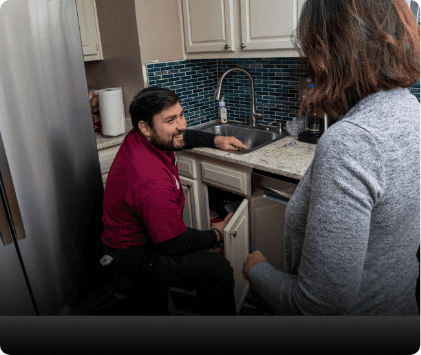
Why Your Drains Are Always Clogged
Drain Cleaning Experts Serving Philadelphia, Bucks, & Montgomery County
Clogged drains are among the most common, yet frustrating, household plumbing issues. They can lead to water backing up, slow drainage, and in severe cases, can cause water damage to your home. At Bill Frusco Plumbing, Heating, & Cooling, we understand the inconvenience and potential hazards of persistently clogged drains. Through years of experience, we’ve identified several reasons why drains tend to clog and how to address them effectively. Let’s dive into the common culprits behind clogged drains and how you can prevent them.
1. Hair Build-Up
One of the leading causes of drain clogs, especially in bathroom sinks and showers, is hair. Over time, hair binds with soap scum and other debris, creating a mass that water cannot penetrate. Regularly cleaning the drain stopper and using a drain guard can significantly reduce hair build-up.
2. Grease and Fat Accumulation
Kitchen sinks often fall victim to clogs due to the improper disposal of grease and fats. When these substances go down the drain, they solidify upon cooling, adhering to the pipes and gradually accumulating debris until a blockage occurs. The best practice is to dispose of grease and fats in the trash rather than washing them down the sink. Additionally, running hot water with dish soap down the drain after washing dishes can help minimize grease build-up.
3. Non-Flushable Items
Toilets are frequently clogged by items that should not be flushed. Despite what product packaging might claim, many wipes, feminine hygiene products, and paper towels are not truly flushable and can quickly lead to clogs. The only items that should be flushed are human waste and toilet paper. Even “flushable” wipes can pose a risk to your plumbing over time.
4. Soap Scum
Soap scum is another common cause of clogs, particularly in homes with hard water. The minerals in hard water can react with soap, forming a hard residue that sticks to pipes and restricts water flow. Installing a water softener can reduce mineral content in your water, mitigating soap scum accumulation. You can also schedule regular drain cleaning to keep pipes clear.
5. Food Waste
Even with a garbage disposal, certain types of food waste should never go down your kitchen sink. Coffee grounds, eggshells, and starchy foods like pasta and rice can create stubborn clogs. These materials don’t break down easily and can swell or stick to the sides of pipes, trapping other debris.
6. Tree Roots
For exterior drainage lines, tree root intrusion can be a significant issue. Roots seek out water sources and can penetrate small cracks in pipes, growing inside and eventually causing blockages. Regular inspections and maintaining a safe distance between trees and your plumbing lines can help prevent this problem.
Prevention and Maintenance
Preventing clogged drains often comes down to regular maintenance and being mindful of what goes down your drains. Here are a few tips:
- Use sink strainers to catch hair and food debris.
- Never pour grease, oil, or fat down the drain.
- Only flush waste and toilet paper down the toilet.
- Consider using mild, biodegradable soaps to reduce soap scum.
- Schedule regular plumbing inspections to catch and address issues early.
Contact Us For Drain Cleaning in Philadelphia, Bucks, & Montgomery County Today
Clogged drains are more than just a nuisance; they can signal or lead to more significant plumbing issues. By understanding what causes these clogs and how to prevent them, you can keep your plumbing system running smoothly. However, some clogs are too stubborn for DIY methods, and that’s where Bill Frusco Plumbing, Heating, & Cooling comes in. With our expertise and state-of-the-art equipment, we can address any clog, big or small, and provide you with solutions to keep your drains clear. Contact us today!
